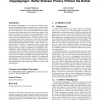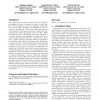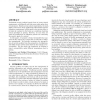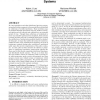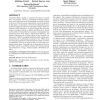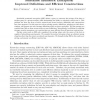CCS
2006
ACM
13 years 8 months ago
2006
ACM
CCS
2006
ACM
13 years 8 months ago
2006
ACM
We introduce Doppelganger, a novel system for creating and enforcing fine-grained, privacy preserving browser cookie policies with low manual effort. Browser cookies pose privacy ...
CCS
2006
ACM
13 years 8 months ago
2006
ACM
Role engineering, the task of defining roles and associating permissions to them, is essential to realize the full benefits of the role-based access control paradigm. Essentially,...
CCS
2006
ACM
13 years 8 months ago
2006
ACM
Traditional security policies largely focus on access control requirements, which specify who can access what under what circumstances. Besides access control requirements, the av...
CCS
2006
ACM
13 years 8 months ago
2006
ACM
In trust negotiation and other distributed proving systems, networked entities cooperate to form proofs that are justified by collections of certified attributes. These attributes...
CCS
2006
ACM
13 years 8 months ago
2006
ACM
We introduce the notion of resiliency policies in the context of access control systems. Such policies require an access control system to be resilient to the absence of users. An...
CCS
2006
ACM
13 years 8 months ago
2006
ACM
Attributes define, classify, or annotate the datum to which they are assigned. However, traditional attribute architectures and cryptosystems are ill-equipped to provide security ...
CCS
2006
ACM
13 years 8 months ago
2006
ACM
As more sensitive data is shared and stored by third-party sites on the Internet, there will be a need to encrypt data stored at these sites. One drawback of encrypting data, is t...
CCS
2006
ACM
13 years 8 months ago
2006
ACM
Searchable symmetric encryption (SSE) allows a party to outsource the storage of his data to another party in a private manner, while maintaining the ability to selectively search...
CCS
2006
ACM
13 years 8 months ago
2006
ACM
Consider a pollster who wishes to collect private, sensitive data from a number of distrustful individuals. How might the pollster convince the respondents that it is trustworthy?...

